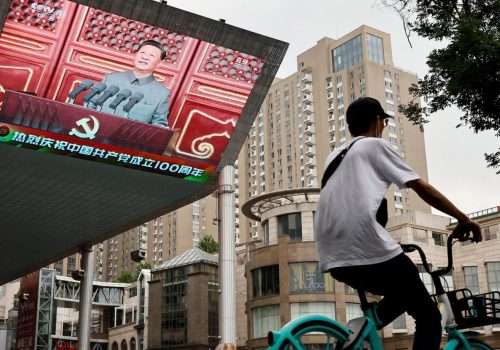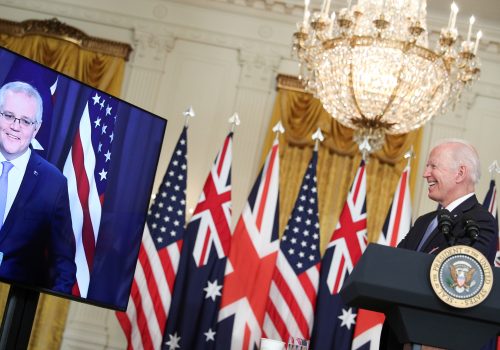FAST THINKING: Breaking down the Biden-Xi virtual summit
GET UP TO SPEED
Can they talk out their tensions? US President Joe Biden connected with his Chinese counterpart, Xi Jinping, for a virtual face-to-face meeting Monday night aimed at cooling off the increasingly heated relationship between their two countries. While the three-and-a-half-hour talk reportedly covered trade, Taiwan, and human rights, it produced no major breakthroughs. But that doesn’t mean it wasn’t a big deal. Our experts explain why.
TODAY’S EXPERT REACTION COURTESY OF
- David Shullman (@DaveShullman): Senior director of the Atlantic Council’s Global China Hub and former US intelligence official focused on East Asia
- Ashley Feng (@afeng79): Nonresident fellow at the Global China Hub
Civil discourse
- Despite their many disagreements, from tensions over Taiwan to restrictive trade policies, the two leaders remained cordial during Monday’s meeting. As Biden called for “simple, straightforward competition,” Xi—who referred to Biden as an “old friend”—said the two sides should boost “communication and cooperation.”
- Simply talking, Dave says, is “critical to minimizing misperception and the risk of unintended conflict.” Just the image alone of the two leaders engaging in dialogue could help ease concerns that they’re “heading into dangerous territory,” particularly with the rising risk of military conflict over Taiwan.
- But concrete matters were also on the table, Ashley adds. Both sides “mentioned the possibility of cooperating on issues like health security, climate change, global energy supplies, and regional security issues such as North Korea, Afghanistan, and Iran.” They also hashed out a fast-track entry process for US business executives arriving in China.
A way with words
- To get a sense of each leader’s priorities, Ashley says, just look at the official readouts of the meeting: The White House emphasized “working with allies and partners to write the ‘rules of the road for the 21st century,’” while Beijing’s foreign ministry “revealed a more assertive Xi” focused on steering US policy on China toward a more “rational and pragmatic” track.
- But the chief flashpoint between the two countries remains Taiwan. After the meeting, the White House said it “strongly opposes unilateral efforts to change the status quo or undermine peace and stability across the Taiwan Strait,” while Xi warned that those playing with fire with regard to the Taiwan dispute “would inevitably burn themselves.”
- In their meeting, Dave notes, Biden demonstrated that the US “commitment to peace and stability” with China “is not inconsistent” with defending US and allied interests and values. In so doing, “the Biden administration has explicitly rejected China’s false narrative that productive cooperation on global challenges like climate requires Washington to refrain from pushback on China’s aggression, [human] rights abuses, and unfair economic practices,” he tells us. “Standing firm on these issues while maintaining dialogue sends an important signal to our allies.”
The (silk) road ahead
- The virtual meeting yielded few results on trade or economic policy, which makes Ashley think that the Biden administration is unlikely to make “any concessions on this front.” She points to upcoming travel to Northeast Asia by Commerce Secretary Gina Raimondo, US Trade Representative Katherine Tai, and Deputy Secretary of State Wendy Sherman as “an opportunity for the administration to further its economic footprint in Asia to counterbalance China.”
- The coming year is a big one for China, as it hosts the Winter Olympics in Beijing and stages the twentieth Party Congress next fall—where Xi is expected to be handed a third five-year term. “Beijing likely views Washington’s request for this meeting despite any concessions from China on key issues such as human rights and trade as evidence that its approach is working, and the United States will eventually retreat from its more confrontational approach,” Dave says. But Washington isn’t showing many signs of retreat, he adds: “China’s sensitivity to US criticism around the upcoming Beijing Olympics and support for Taiwan will undoubtedly inflame tensions.”
Further reading
Sun, Oct 17, 2021
We’re at the perilous beginning of an uncertain era in US-China relations
Inflection Points By Frederick Kempe
The United States and China represent the most significant bilateral relationship in human history—and neither side is managing their rising tensions with adequate skill or durable strategy.
Tue, Oct 5, 2021
The 2021 Economic Scorecard: How China stacks up with the US and its allies
The Big Story By Josh Lipsky
With China, the story is never so simple. The truth is that China still hasn’t decided which direction its economy is ultimately headed. And we need a credible way to track its trajectory.
Thu, Sep 16, 2021
FAST THINKING: Can Australian nuclear subs help corner China?
Fast Thinking By
What impact will this deal have on competition with China? What about the allies left high and dry? Our experts emerged from the deep with the answers.
Image: US President Joe Biden on a virtual meeting with Chinese President Xi Jinping on November 15, 2021. Photo via REUTERS/Jonathan Ernst.


